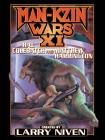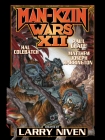Man-Kzin Wars XI by Hal Colbatch (ereader manga txt) 📗

- Author: Hal Colbatch
Book online «Man-Kzin Wars XI by Hal Colbatch (ereader manga txt) 📗». Author Hal Colbatch
"We'll use the motor now," said Vaemar. "I think we ought to have steerage way." Many of the channels were wider here and silence was less important for observation than it had been when they were slipping between narrow banks. In any case, the deserted dwelling was not entirely reassuring and steerage-way, they tacitly agreed, could be a useful thing to have.
GPS satellites provided them with a moving map that had at least reasonable accuracy, though they soon learnt to treat it with caution. A translucent panel and a camera below the water-line in the bow showed an endless parade of living things. Cruising on minimum power they had some groundings on soft mud, but these were no more than a nuisance. There were things like horseshoe crabs and things like giant centipedes, mud-colored things and things whose bright colors shouted poison. The life they stirred up getting the canoe off reminded the students that the mud-banks were a whole new ecosystem waiting to be explored.
After about three more hours they came to the fish-processing business Marshy had spoken of. The buildings—high, strong-walled and windowless in the lower part—and the boat tied up there were kzin-sized, not human. There were a multi-purpose radar dish, fences, and a security watch-tower. Kzinti living away from human supervision were allowed only light and basic hunting weapons, but the place had a secure look about it. There was a sign-board giving the name of the business in both kzin and almost correct human scripts—still a slightly odd sight on Wunderland, but much less so than it would have been ten years previously. There was also a large air-car, disarmed but plainly ex-military, parked on a landing-pad. Vaemar and Swirl-Stripes called a greeting in the Heroes' Tongue as they approached. There was no answer.
"This," said Hugo, "is getting monotonous."
Vaemar steered the canoe away from the island and into a sheltered creek out of sight of it. They erected bulwarks and metal mesh-screens covering the benches and steering position. They rechecked and cocked their weapons, and approached the island again. Motion detectors and infrared sensors keyed to pick up the body-heat of large life-forms told them nothing in the jumble of land and water and what was virtually a broth of small quick lives. Scanning and filming, they cautiously circumnavigated the island, and a couple of surrounding ones. Apart from the absence of the kzinti, nothing seemed out of the ordinary. There were a couple of big crocodilians working the channels, but even if they were a threat to adult kzinti, the electronic and physical defenses of the place should have kept them out with ease—it was what they were designed for. There were a cloud of flying creatures round the fish-drying sheds and the smell from these was almost overpowering.
Weapons ready, they landed. Movement near the water. The snout of an automatic gun—illegal for outdwelling kzinti—was tracking them. In the instant it took Vaemar to identify it he knew that, had it been set to fire, they would have been already dead. On examination it had no ammunition. Fences carried lethal electric current but the gate was open. The main door was not merely unlocked but part open as well. Vaemar's fur bristled. This was an unheard-of thing among kzinti, save when a great one wished to show either his overwhelming security or to be extravagantly hospitable.
The racks of drying fish, some glowing brightly in decay, had attracted a multitude of small creatures apart from those circling and fighting in the air. The operating log of the processing machinery which converted the fish into highly flavored bricks much enjoyed by some kzinti, both by themselves and as a relish to ice creams and other foods, showed it had not been in use for several days.
"I estimate this operation was run by about five kzintosh," said Vaemar, when they assembled in the main building. "In addition there were kzinrretti and kittens."
That would not have been the case before Liberation. High kzin nobles had extensive harems. Kzin kittens were usually born as male and female twins and the daughters were a valuable commodity for their fathers, negotiable instruments and presents to both superiors and clients. A mid-ranking officer of partial Name might have a clawful of females, including some from the harems of any rivals he might have quarrelled with successfully. The military hierarchy had its own system of allocations. What one human student had called "honored upper lower middle-class" kzinti—NCOs of partial name, for example—might be allotted a single female each. Naturally these tended to be both less attractive and less fertile than those the nobles kept for themselves. But since the Liberation things had become very different—so many high kzin nobles, officers, and indeed kzin males in general, were dead that there were enough kzinrretti for even kzinti in trade, like these fishermen. The human government had encouraged this change in customs for several reasons, partly on the theory that females and offspring of their own would tend to give more kzintosh a vested interest in stability. Anyway, the small factory and the attached dwellings were empty.
"We stay together and search," said Vaemar. As Marshy had told him that some of the swamp folk were inclined to blame the human disappearances on the kzinti, it had occurred to him that humans, Exterminationists or vigilantes, might very well be responsible for the disappearance of the kzinti. But humans could not fight kzinti without weapons, and there was no obvious sign that weapons had been used here—no sign of blast damage or burning from beams or plasma-guns. No lingering molecules of poison gas were detected, though their safety equipment included a highly sensitive analyser. The empty gun was a puzzle. Had it been put there by the kzinti as a bluff, or had it in fact fired off its charges in battle?
Within the main building there was a computer, a standard kzinti Naval model with





Comments (0)